
Iraqi soldiers guard blindfolded detainees 40 miles northeast of Baghdad.
Like many in Iraq, Maj. Gen. Joseph Fil, the U.S. commander for Baghdad, senses that insurgents are down but not out, despite a drop in violence across the country. Al-Qaeda in Iraq, the umbrella insurgent group of Sunni militants, no longer has a foothold in Baghdad, Fil said. But he believes the organization's fighters remain poised to reassert themselves. "Al-Qaeda, though on the ropes, is not finished by any means," said Fil, speaking to reporters in Baghdad. "They could come back swinging if they're allowed to. In fact, we've seen it." Fil said areas of Baghdad that have previously been havens for Sunni militants can and have quickly become insurgent territory again if U.S. and Iraqi security forces are not watchful.
The general's blunt warning about the continuing presence of Sunni militants in Iraq came amid further signs that Baghdad's violence has dropped significantly. U.S. military commanders have reports that up to 200 families have resettled in the northwest quarter of the city, where sectarian violence forced thousands to flee over the past year. Overall violence in Baghdad, Fil said, has dropped 45% and continues falling each month. Fil thinks the trend can continue even as U.S. troops begin to lessen their presence in the coming months, as forces sent as part of the surge strategy wind down their time in Iraq. But few in Baghdad believe the insurgency is spent. Many, including Fil, take as a given that some bold strike by Sunni extremists will come.
When and how remains to be seen. Sunni extremists have been largely forced out of Anbar province by tribal fighters aligned with the U.S. military. In Baghdad, many former insurgent groups with a more nationalist outlook have violently broken with extremist elements of the insurgency, leaving the hardcore Islamist fighters of al-Qaeda in Iraq with fewer neighborhoods where they can operate safely. In Diyala, which saw an influx of insurgent fighters as Anbar grew quieter, U.S. forces are making some gains in uprooting extremists in and around Baqubah, the troubled provincial capital.
Over the summer U.S. commanders in Samarra, another key area where Sunni militants have operated with strength in the past, said they saw a rise in insurgent activity there as the dynamics in Anbar, Baghdad and Diyala took shape. But so far the city has not emerged as a battleground against the insurgency in the way Ramadi and Baqubah did over the past year. Iraq's predominantly Shi'ite southern regions offer little sanctuary for Sunni extremists.
So, where has al-Qaeda gone? Somewhere near, Fil says, waiting for the right opportunity to land another blow. "They can re-infest very quickly," Fil said. "They will work hard to come back. And they're capable at any time of coming in from outside the city and delivering car bombs. And they would love to punch with yet another very strong swing."
